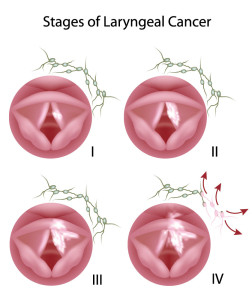Before the appropriate treatment can be given, the patient’s staging of throat cancer (extent of patient’s cancer) needs to be known in detail. The following table summarizes the American Joint Committee on Cancer Staging for Laryngeal Cancer (modified according to Ref. 1, p.639):
Staging of throat cancer (laryngeal cancer)
Stage:
I : cancer confined to site of origin, normal mobility
II : cancer invades adjacent supraglottic area or vocal cord without fixation, no lymph node metastases
III : cancer limited to larynx with fixation or local extension, there could be local lymph node metastases
IV : cancer mass extends beyond larynx, destroyed thyroid cartilage, or spread to other areas, locally or via distant lymph node metastases and distant metastases
Like with other cancers it is important to be sure that the cancer is still local before treating it as such. The treatment must be much more comprehensive for a more advanced cancer.
In the following brief outline I will comment on the different treatment modalities. Briefly, with stage I or II surgery and radiation are utilized; for stage III total laryngectomy is required and for stage IV total laryngectomy, neck dissection and post operative radiation are combined. A more detailed discussion regarding this can be found under “treatment of throat cancer”.
References:
1. Cancer: Principles &Practice of Oncology.4th edition. Edited by Vincent T. DeVita, Jr. et al. Lippincott, Philadelphia,PA, 1993. Chapter on Tumors of the Larynx and Hypopharynx.
2. Cancer: Principles&Practice of Oncology. 5th edition, volume 1. Edited by Vincent T. DeVita, Jr. et al. Lippincott-Raven Publ., Philadelphia,PA, 1997. Chapter on Tumors of the Larynx and Hypopharynx.
3. SM Jackson et al. Radiother Oncol 2001 May;59(2):219-220.
4. Conn’s Current Therapy 2004, 56th ed., Copyright © 2004 Elsevier
5. Ferri: Ferri’s Clinical Advisor: Instant Diagnosis and Treatment, 2004 ed., Copyright © 2004 Mosby, Inc







